
Luigi's Mansion is a 2001 action-adventure game developed and published by Nintendo. The game was a launch title for the GameCube and was the first game in the Mario franchise to be released for the console; it was released in Japan on September 14, 2001, in North America on November 18, 2001, in Europe on May 3, 2002, and in Australia on May 17, 2002. It is the third video game in which Luigi is the main character instead of Mario, after Mario Is Missing! and Luigi's Hammer Toss. Players control him as he explores a haunted mansion, searches for Mario and deals with ghosts by capturing them through a vacuum cleaner supplied by Professor E. Gadd.

Cotton swabs or cotton buds are wads of cotton wrapped around a short rod made of wood, rolled paper, or plastic. They are most commonly used for ear cleaning, although this is not recommended by physicians. Other uses for cotton swabs include first aid, cosmetics application, cleaning, infant care, and crafts. Some countries have banned the plastic-stemmed versions in favor of biodegradable alternatives over concerns about marine pollution.
Super Smash Bros. is a crossover platform fighting game series published by Nintendo. The series was created by Masahiro Sakurai, who has directed every game in the series. The series is known for its unique gameplay objective which differs from that of traditional fighters, in that the aim is to increase damage counters and knock opponents off the stage instead of depleting life bars.

The 3Ds were a New Zealand noise pop band based from Dunedin, together from 1988 to 1997. They recorded three albums and several EPs, the best known of which is The Venus Trail (1993). They achieved commercial and critical success worldwide in the period between 1992 and 1995.

Fish Tales/Swarthy Songs for Swabs is a CD compilation album by New Zealand band the 3Ds, released in 1991. It has tracks from their first and second vinyl EPs, Fish Tales and Swarthy Songs for Swabs, as well as previously unreleased tracks.
3D, 3-D or 3d usually means three-dimensional or three dimensions and may refer to:
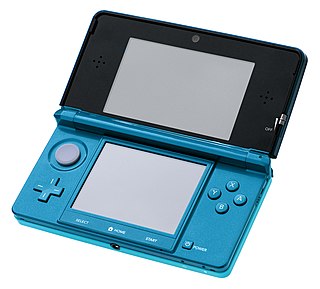
The Nintendo 3DS is a foldable handheld game console produced by Nintendo. The console was announced in March 2010 and unveiled at E3 2010 as the successor to the Nintendo DS. The system features backward compatibility with Nintendo DS video games. As an eighth-generation console, its primary competitor was Sony's PlayStation Vita.
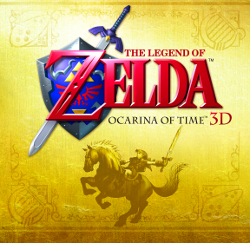
The Legend of Zelda: Ocarina of Time 3D is a 2011 action-adventure game developed by Grezzo and published by Nintendo for the Nintendo 3DS handheld game console. A remake of the original 1998 Nintendo 64 game, it features updated graphics, quality of life changes, stereoscopic 3D effects, and mirrored versions of the rearranged dungeons from Ocarina of Time Master Quest. The game was released in June 2011, with digital release via the Nintendo eShop arriving in 2012.
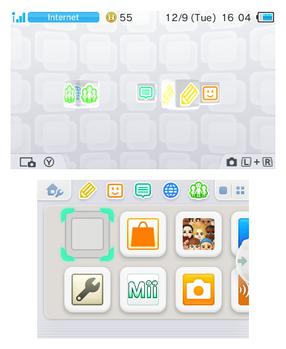
The Nintendo 3DS system software is an updatable operating system used for the Nintendo 3DS handheld system. The Nintendo Switch system software is believed to have evolved from the Nintendo 3DS operating system.
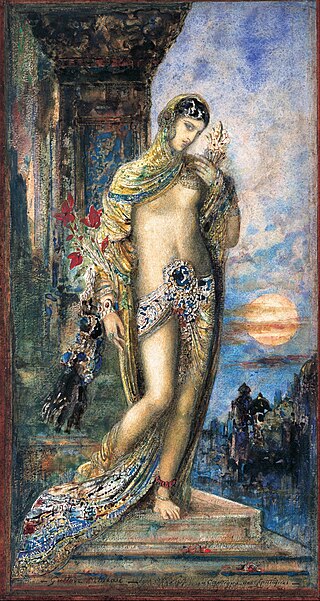
A Shulamite is a person from Shulem. The Hebrew Bible identifies as a Shulamite the swarthy, female historical figure in the Song of Songs.

The Nintendo eShop is a digital distribution service for the Nintendo Switch, and formerly available via the Nintendo Network for the Wii U and Nintendo 3DS. The Nintendo eShop was first launched in June 2011 on the Nintendo 3DS via a system update that added the functionality to the HOME Menu. It is the successor to both the Wii Shop Channel and DSi Shop. Unlike on the Nintendo 3DS, the eShop was made available on the launch date of the Wii U, although a system update is required in order to access it. It is also a multitasking application, which means it is easily accessible even when a game is already running in the background through the system software, though this feature is exclusive to the Wii U and the Nintendo Switch. The Nintendo eShop features downloadable games, demos, applications, streaming videos, consumer rating feedback, and other information on upcoming game releases.

Super Smash Bros. for Nintendo 3DS and Super Smash Bros. for Wii U, both commonly referred to together as Super Smash Bros. 4 or Smash 4, are 2014 crossover platform fighter video games developed by Bandai Namco Studios and Sora Ltd. and published by Nintendo for the Nintendo 3DS and Wii U video game consoles. It is the fourth installment in the Super Smash Bros. series, succeeding Super Smash Bros. Brawl. The Nintendo 3DS version was released in Japan on September 13, 2014, and in North America, Europe, and Australia the following month. The Wii U version was released in North America, Europe, and Australia in November 2014 and in Japan the following month.

Theatrhythm Final Fantasy is a rhythm video game, developed by indieszero and published by Square Enix for Nintendo 3DS and iOS. Based on the Final Fantasy video game franchise, the game involves using the touch screen in time to various pieces of music from the series. The game was released in Japan in February 2012, and in North America, Australia and Europe in July. An iOS version was released in December. A sequel, Theatrhythm Final Fantasy: Curtain Call, was released in 2014. A third game based on the Dragon Quest series, Theatrhythm Dragon Quest, was released in 2015. An arcade game, Theatrhythm Final Fantasy: All-Star Carnival, was released in 2016. A second sequel, Theatrhythm Final Bar Line, was released on February 16, 2023, for Nintendo Switch and PlayStation 4.

Hatsune Miku and Future Stars: Project Mirai is a 2012 rhythm game created by Sega and Crypton Future Media for the Nintendo 3DS. The game is a spin-off of the Hatsune Miku: Project DIVA series of Vocaloid rhythm games and was first released on March 8, 2012 in Japan with no international release. Like the original, the game primarily makes use of Vocaloids, a series of singing synthesizer softwares, and the songs created using them, most notably the virtual-diva Vocaloid Hatsune Miku. It is also the first game in the franchise to include a Vocaloid made by Internet Co., Ltd.; the mascot of Megpoid, Gumi, appears as a guest star.
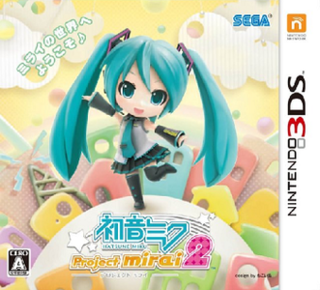
Hatsune Miku: Project Mirai 2 is a rhythm game created by Sega and Crypton Future Media for the Nintendo 3DS and the sequel to Hatsune Miku and Future Stars: Project Mirai. The game is also a spin-off of the Hatsune Miku: Project DIVA series of Vocaloid rhythm games and was first released only in Japan on November 28, 2013. Like the original, the game primarily makes use of Vocaloids, a series of singing synthesizer software and the songs created using these vocaloids most notably the virtual-diva Vocaloid Hatsune Miku. It is also the second game to include a Vocaloid made by Internet Co., Ltd., Gumi. An updated version of the game was released in 2015, first in Japan as Hatsune Miku: Project Mirai Deluxe, then in North America and Europe under the title of Hatsune Miku: Project Mirai DX.

Theatrhythm Final Fantasy: Curtain Call is a 2014 rhythm video game developed by indieszero and published by Square Enix for the Nintendo 3DS. As a sequel to the Theatrhythm Final Fantasy (2012) and the second title in the Theatrhythm series, Curtain Call retains the core gameplay, where players hit notes in time with music from the Final Fantasy series. Also similar to its predecessor, the game features role-playing elements, allowing players to develop their characters, arrange parties with four-person, and defeat bosses to clear quests.
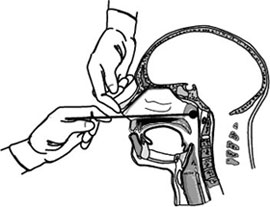
A nasopharyngeal swab is a device used for collecting a sample of nasal secretions from the back of the nose and throat. The sample is then analyzed for the presence of organisms or other clinical markers for disease. This diagnostic method is commonly used in suspected cases of whooping cough, diphtheria, influenza, and various types of diseases caused by the coronavirus family of viruses, including SARS, MERS, and COVID-19.

Disney Magical World 2 is a life simulation video game and a sequel to Disney Magical World. The game was released for the Nintendo 3DS on November 5, 2015 in Japan and in October 2016 in North America, Europe, and Australia. Compared to its predecessor, the game added new features, costumes, worlds, and more characters. The theme song for the game is "Sparkle ~Kagayaki wo Shinjite~" by May J.

Aikatsu Stars! is an arcade collectible card game in Bandai's Data Carddass line of machines, which was launched in May 2016. It is the successor to the Aikatsu! series of arcade games. The game revolves around using collectible cards featuring various clothes to help aspiring idols pass auditions. An anime television adaptation by BN Pictures began airing on TV Tokyo from April 7, 2016, to March 29, 2018. It was succeeded by Aikatsu Friends! on April 5, 2018.
Bakutsuri Bar Hunter is a Japanese media franchise created by Bandai, Shogakukan, Studio Gallop, and Toei Animation. It consists of a toy line that started releasing on March 17, 2018, a Nintendo 3DS game, a manga series and an anime television series.

















